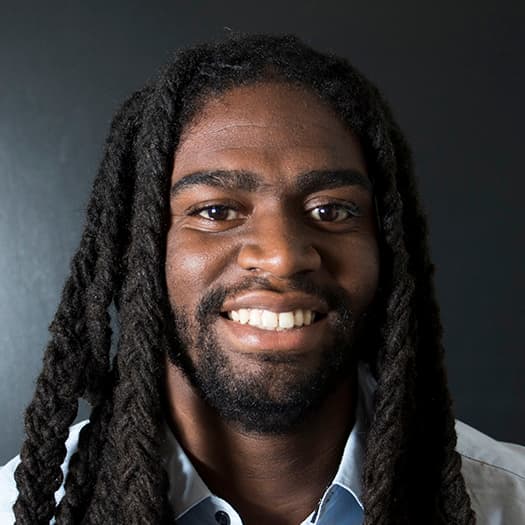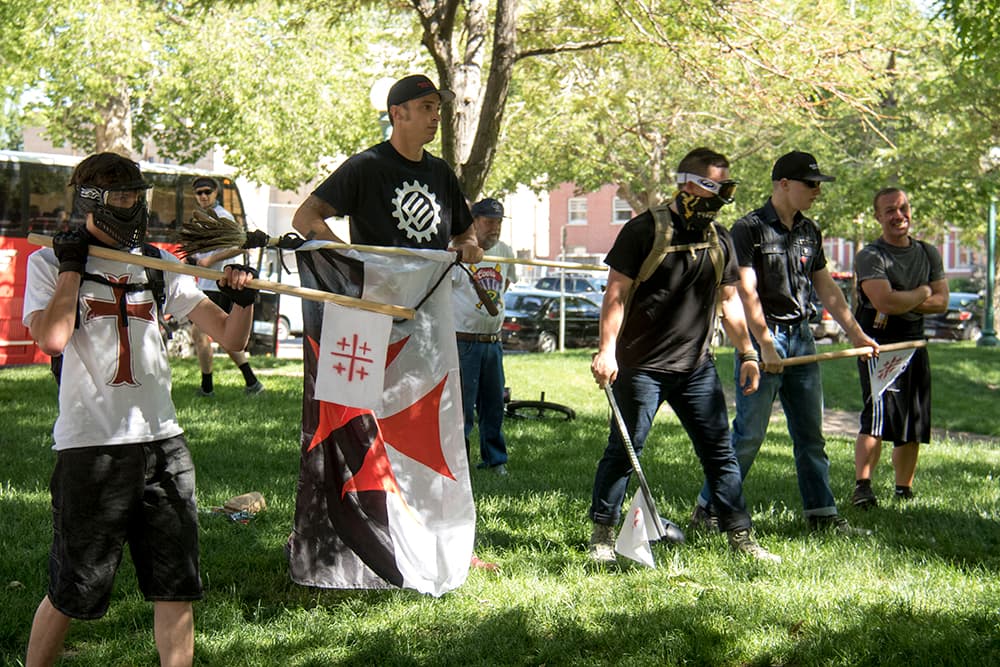In Colorado, hate crimes are on the rise and the groups committing these acts function differently than they used to. Hate groups have taken on a new face with new tactics, moving their operations from the shadow world of the internet and into the sunlight with public-facing activities like large rallies, political events and posting propaganda flyers.
Just this year the Anti-Defamation League is aware of about 50 white supremacist incidents, according to senior associate and regional director Jeremy Shaver, with nearly half taking place between July and early September. Colorado has historically been on the statistical low end of hateful acts, but with this recent uptick in activity, Shaver said, we are quickly catching up to the national average.
So far this year, the ADL has found white supremacist propaganda in 50 places around the state — mostly the Front Range. That's up from 22 total last year and just three the year before, the Denver Post reported.
“Certainly in the parts of the country that have been impacted by immigration issues, we’ve seen more activity," Shaver said. "The East Coast and the Southeast have really had a high level of activity. Colorado up until this year had been relatively untouched. Starting this year, we’ve seen an increase."
This increase in activity does not necessarily correlate with an increase in membership or legitimacy of extremist organizations but rather, Shaver said, may be a thinly veiled attempt by these organizations to convince people they have more clout than they actually posses.
One consequence of the emergence of these groups into a more public sphere is an increased threat of physical fights — and actual physical fights.
With more hate-group rallies comes more counter-protests, and vice versa.
About a week ago, the Post reported, a Colorado State Patrol officer at a recent right-wing rally on the Capitol steps suggested to the crowd, including members of far-right men's group the Proud Boys, "If you want to fight, stick around. I’ve got a couple of guys, they also want to fight." In February, protests outside an event at Colorado State University featuring a speaker from the conservative group Turning Point USA turned violent when a group charged the protesters, holding riot shields and large flashlights, wearing face masks and chanting a Nazi slogan, the Coloradoan reported.
And those are just two examples. Shaver says these types of physical altercations are becoming more common in the state. Over the past 18 months, there have been several clashes, with the most prominent altercations happening on college campuses.
“To avoid violent conflict, it is critical for law enforcement to learn some important lessons from the Unite the Right Rally in 2017, such as keeping distance between protestors and counter-protestors and taking immediate action when violence erupts. We urge law enforcement to protect the First Amendment rights of protestors and counter-protestors and at the same time to be prepared to take action if violence does surface. We also urge counter-protestors to speak up forcefully against white supremacy, but to be careful to select a different location or venue in order to avoid any conflict or violence,” Shaver said.
Not all traumatic experiences involving hateful rhetoric rise to the level of a hate crime, leaving victims lost.
Hate crimes themselves are underreported for reasons Rachel Nielsen, director of the Colorado Resilience Collaborative and professor of international disaster psychology at the University of Denver, said can be likened to the reasons behind the underreporting of sexual assault.
Traumatic, non-criminal offenses where people are harassed for their race, religion or sexual orientation are likely more underreported than clear-cut criminal actions, Nielson said. Many people who find themselves victims of these abuses often don’t know where to turn because they're afraid of the ramifications of reporting or they're unaware of the resources available for their protection.
“One confounding issue is the difference between what meets the legal definition for a hate crime versus what constitutes a traumatic experience. For instance, hate speech like calling someone a derogatory name would not meet the legal definition but can still be frightening and traumatic for an individual,” Nielson said. “Many such incidents — approximately one in six hate crimes — go unreported for reasons including not wanting to be outed as part of a particular group, not wanting to go through the legal process, not believing that law enforcement can or will help, and assuming that their incident won't be considered a hate crime, and therefore it is futile to report.”
Nielsen noted that it is critical for those people to get the support they need because unresolved trauma can manifest in a variety of bad ways. She said agencies on the federal, state, city and neighborhood level have stepped up in recent years to provide accessible resources to vulnerable populations in Colorado.
“Things like having someone say something terrible about you because they think you’re an immigrant are part of the LGBTQIA community, if that is true or not, it can be a scary, othering situation. ... The sooner people can get services the better the outcome,” Nielson said. “This is unfamiliar to most people in our state — about what the laws are, what rises to meet the criteria for a hate crime. There a lot of things that don’t reach that [level] that are still traumatizing and frightening.”
She says there can additional hesitance in marginalized communities because of the unclear consequences of reporting. This can be especially tricky for immigrant communities who may not feel comfortable working with the government or who come from countries where the government cannot be trusted.
Hate groups are getting louder in places where their members feel more strongly opposed, which means Denver has a problem.
Cities and towns that are working through immigration debates or economic disparity, Shaker said, can turn into breeding grounds for groups like the Proud Boys, and white supremacy groups the Patriot Front and Identity Evropa. Denver has those conditions and those heightened tensions, and Shaver says that means our reaction to these groups is more crucial than ever before.
“In addition to immigration reform, I think the answer depends on how we decide to address a range of issues facing our country, including growing economic disparity, changing demographics, increasing partisan political divisions and simmering racial inequality," he said. Immigration is in the midst of these issues. Part of the increase we're seeing in extremist activity is a response to these issues and challenges."
According to Shaver, public policy will have a significant impact on the future of these organizations and whether their message will be able to fully cross over into the mainstream social and political arenas or remain a fringe element condemned by most Denver residents.
"[Hate group] activity tears away the sense of community safety, and that shouldn’t be tolerated. All people deserve to live in freedom dignity and safety," he said.












